Monday Feb 16, 2026
Monday Feb 16, 2026
Thursday, 13 May 2021 00:41 - - {{hitsCtrl.values.hits}}
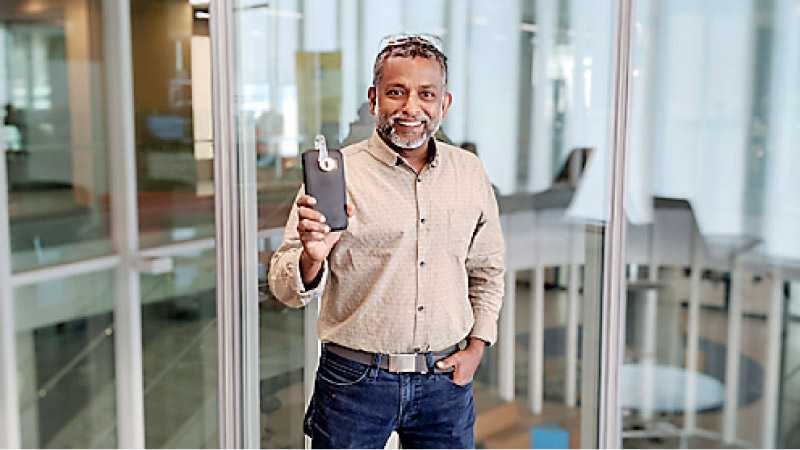
Dr. Sivam Krish
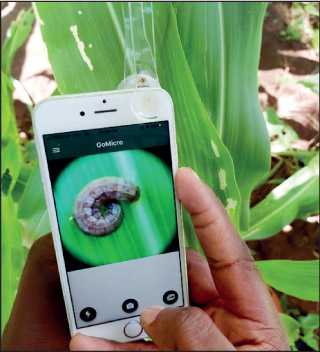 |
| FAW in corn |
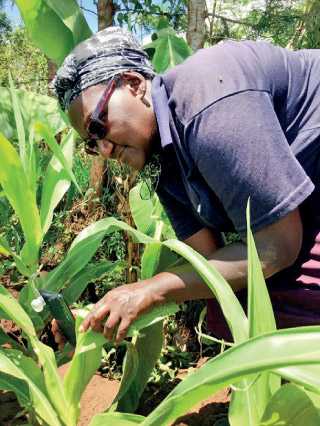 |
| Field testing in Kenya |
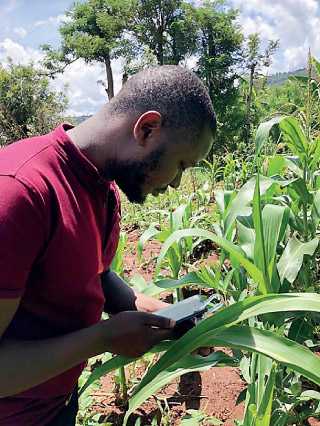 |
| Testing in Kenya |
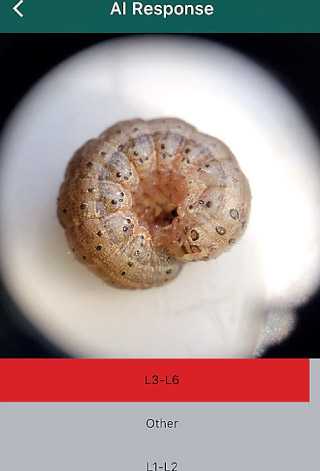 |
| Examine AI App |
Fall armyworm (FAW) is an invasive pest originating from South American now spreading worldwide, including Sri Lanka affecting the livelihood of over 600 million farmers. Farmers in Sri Lanka who have never encountered this pest struggle to identify this pest particularly in its larval stage – to take preventative action that will stem the devastation that will soon follow.
This is where Go-Micro’s AI platform combining smartphone, phone attachment and AI software powered by Google’s Tensor Flow technology is set to make an impact.
Until recently, agriculture researchers have had difficulty deploying laboratory developed AI applications in the field without experiencing a significant drop in accuracy. This is due to the differences in lab-based and in-field phone imaging.
“By designing a clip-on device to create lab-quality imaging conditions on the phone for both for collecting training images for deploying the AI application. We have eliminated the differences in imaging conditions, delivering accuracies that have not been achieved before,” GoMicro CEO and founder Dr. Sivam Krish said.
The University of Ruhuna has helped solve this problem by providing images of fall armyworm taken with GoMicro in various locations in Sri Lanka.
“At the University of Ruhuna, Sri Lanka, we have been building and testing AI apps developed with GoMicro. We believe that this technology will pave the way to provide farmers in Sri Lanka AI-assisted early and accurate diagnosis of pests and plant diseases,” said Prof. K. L Wasantha Kumara of Ruhuna.
Dr. Sivam Krish is also a visiting lecturer at the University of Ruhuna where he is helping to train the next generation of agricultural students in the use of AI in Agriculture. The AI engines for fall armyworm detection were built by AI Engineer Kasun Weerasorria based in Colombo along with Imagine processing engineer Maliesha Kalutota.
GoMicro’s patent-pending technology has found many applications, from tuna assessment in Sri Lanka to pomegranate assessment in Peru. The company is now focusing on tackling major pest issues with its ultra-low-cost phone attachment that will soon give every farmer the analytical capacity of an agronomist.
GoMicro recently won the BayerGrants4Agcompetition that made it possible to work with a wide range of researchers globally in developing AI Apps rapidly and economically. Its record-breaking accuracy in detecting the fall armyworm has now been validated independently by researchers in Kenya, UK, India, and Sri Lanka.
“Building a conventional AI diagnostic app usually requires AI expertise, thousands of dollars, and thousands of images for training the diagnostic applications. In contrast, using Google’s Mobile Net 2, GoMicro has built AI detection applications working above 95% accuracy with just 100 images. Google’s Teachable Machine AI training site has enabled us to teach the basics of AI to agronomists worldwide, make it possible to crowd-source the building and testing of AI applications – to serve local needs at great speed and low cost,” Dr Krish said.
GoMicro is now distributed by Australia’s pre-eminent agriculture company Elders Ltd. Discussions are now underway with a global agrochemical company for AI identification of FAW at the right larval stage for the application of bio pesticides in Kenya. Global research institutions such as CGIAR[RL2] are now evaluating the technology for their own R&D applications. Farmers in developing nations do not have access to agronomist to assess the pest issues resulting in a significant misuse of pesticides. Accurate AI detection of the plant and pest issues will help farmers to choose the proper chemical remedy.
GoMicro’s goal is to democratise the building and deployment of phone-based AI applications. It is currently developing a version smartphone clip-on magnifier that will cost less than $1 to manufacture. Global warming and increasing global trade will make the rapid identification and responses to invasive pests and diseases a necessity. The coronavirus pandemic has demonstrated the value of reliable early detection. “We hope that GoMicro will help prepare farmers to identify and take action on invasive plant diseases and pests that are yet to come.”
Associate Professor Mark McDonnell, Machine Learning Expert (Commented in a private capacity, without reference to his current employer UNISA) said: “Together, the latest in AI software for recognising the contents of magnified images all on a smartphone is a powerful combination.”
Professor Rob Lewis, former CEO of the South Australian Research and Development Institute (SARDI), currently Chairman of Sensibility Ltd., said: “The GoMicro platform is an exciting example of the successful integration of key technologies (mobile, microscopy, machine learning and interpretive data analyses) to deliver next-generation AI solutions aimed at improving Australian fisheries, agriculture production systems, biosecurity vigilance and protection.”
Ruth Carter, Lancaster University, UK said: “GoMicro technology could be used for early accurate identification of FAW, which is important for bio pesticide success.”
Assistant Prof. Sharanu Deshmukh, KVK Agricultural Research Station, Mangalore, India said: “The AI developed by GoMicro Technology can be used in the early detection of fall armyworm on a real-time basis and helps in the management of FAW.”
Dr. Namikoye E. Samita, Lecturer, Kenyatta University, Kenya said: “I got an opportunity to test in the field at KALRO Katumani in Kenya together with one of the team members whom we have been working with. The device is easy to use, and it is precise and quick to make an identification.”
Geoffrey Nyapom, Fall armyworm research champion, Kenya added: “I am excited by the potential of this technology. I am keen to see it being used by farmers in Kenya and not only for the detection of fall armyworm but for a wide range of agricultural issues.”
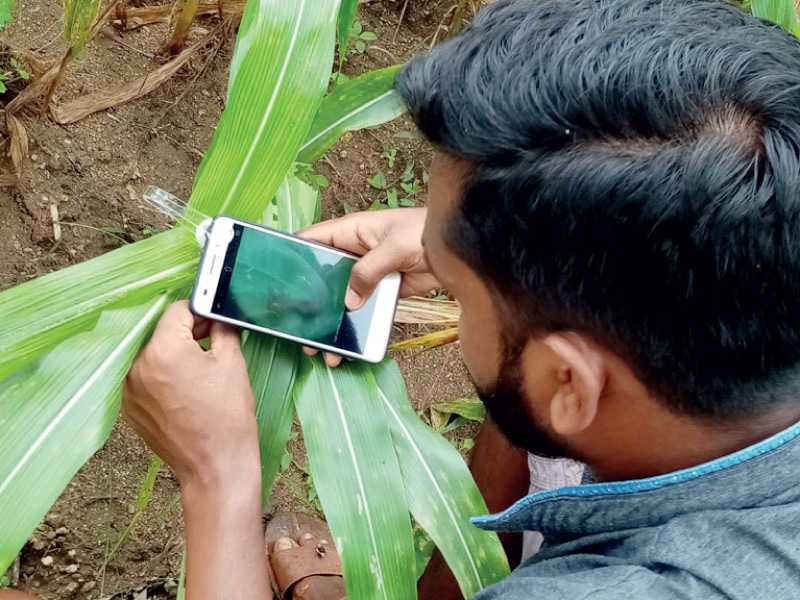
FAW Identificaion in Sri Lanka
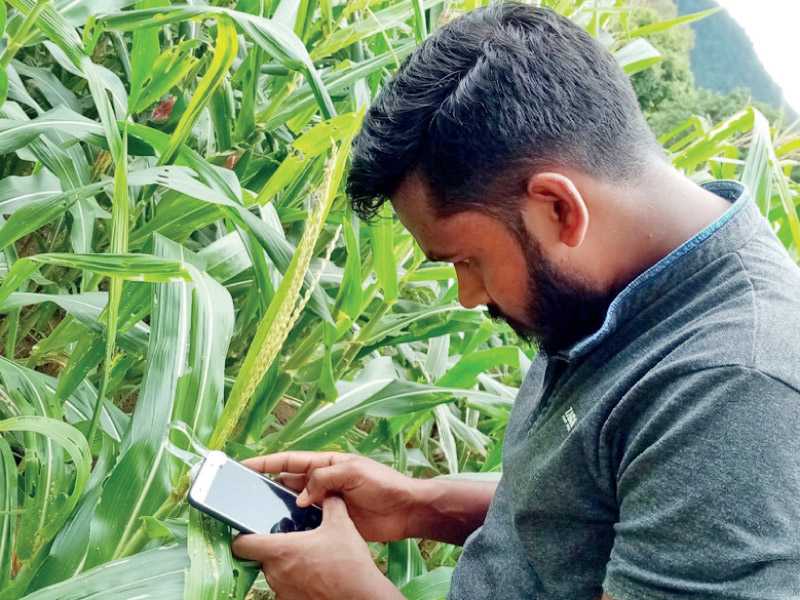
Testing in corn field in Sri Lanka
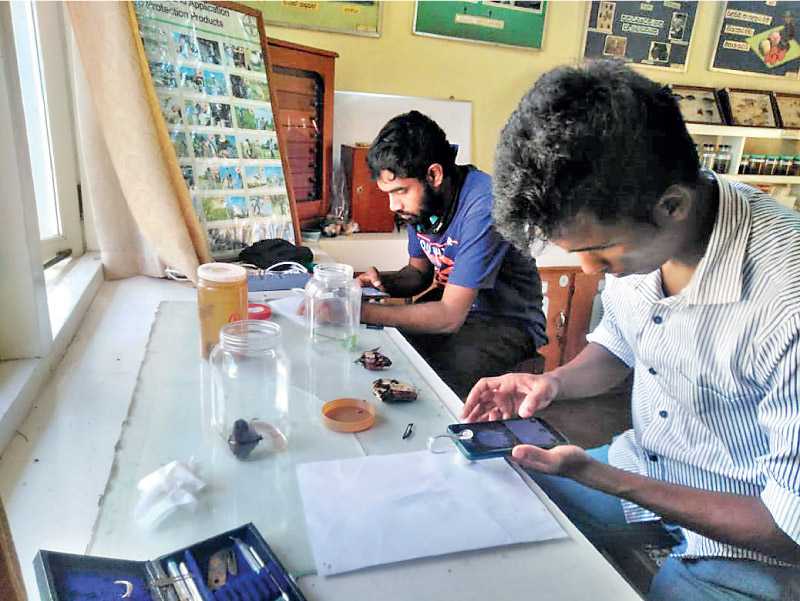
University of Ruhuna students testing the app accuracy